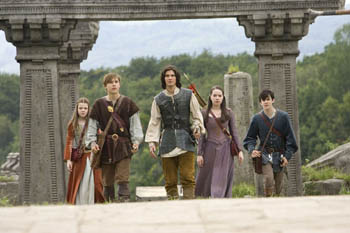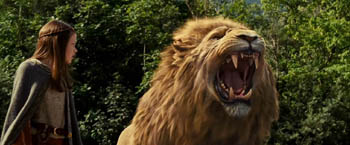|
If my memories of the first Narnia book, The Lion, the Witch, and the Wardrobe, were somewhat vague and indistinct, then my recollections of Prince Caspain are frankly too annihilated by time to be of any use at all, and I'll be forced to judge the worth of this film based soley on its own merits, independent of its source material. This is probably the best way to review a book-to film adaptation anyway, despite the fact that I almost never do it. So what have I to say about Prince Caspian? It's, you know, all right.  One year after the events of the first film, the gender-balanced quadro gang of Pevensie siblings are suddenly swept back into Narnia, where 1300 years have passed since they left. The place is not what it once was: a human group called the Telmarines has taken over and driven the previous inhabitants of talking animals and Greek mythological beasts so far into retreat they're believed to be extinct. The titular Prince Hamel-I mean, Caspian, is forced to beat a hasty retreat from his castle after his aunt gives birth to a son, giving his scheming uncle no reason to keep Caspian around anymore, preferring to entrust the kingdom to his own newborn heir. Caspian soon finds that the Narnians are not as extinct as once believed, and, being an all-around decent hero type, decides to lead them to victory over their oppressors, his own people. This newly-formed army quickly runs into Narnia's former kings and queens, now children once more and not quite as impressive as the legends suggest, and band together with the common goal of giving Narnia back to its people-or, you know, critters and such. And all wonder, in the midst of this dire need, where their one-time savior Aslan has gotten to, having gone unseen since the Pevensies disappeared over a millennium prior. For most of the film, all of this works just fine and is fun to watch. The effects are good, the acting is just fine, the locations are pretty, and it's quite enjoyable. Part of the problem lies with the fact that the film (and this was true for the first one, as well) never seems to establish its own distinct personality. Director Andrew Adamson has put together a perfectly serviceable film with occasional dashes of visual neatness, (the subtle handling of the portal back to our world comes to mind), but basically gives us Standard Fantasy Film Direction Style, indistinguishable from dozens of others, lacking the visual nuance of films such as Legend or the Lord of the Rings trilogy. For that matter, while there's nothing in this film as immediately aggravating as Jar Jar Binks, Phantom Menace has about a hundred times as much personal voice. This could be ignored if the film was just dandy in all other departments, but unfortunately it drops the ball in the end on several different levels. Whether such things occurred in the book version or not, it remains extemely hard to ignore the fact that the climactic battle recycles two major victory scenes from Lord of the Rings, and the fact that these films are still so recent makes seeing these scenes distracting and frankly disappointing. (Tolkien and Lewis were friends, and while Lord of the Rings was written several years before, it wasn't published until several years after Prince Caspian, so which of the two men may have borrowed from the other, if indeed they did, is difficult to know.) Near the film's midpoint, there's a development which suddenly seems poised to make things go seriously south for the heroes, which resolves within minutes and leads to nothing-this scene could come right out of the film with no functional loss, much like the spleen of the movie. There's some pretty sappy Christian-esque "rock" that plays over the final scenes and is just plain bad, and it makes the whole wrap-up feel cloyingly sugary. Also, I'm given to understand from my girlfriend, the prince is wearing a laughably silly shirt in his last scene. I'm a guy and don't really give a crap about costuming as such, but if you do, then you might be struck with the giggles, as well. 
It's in the area of preachiness that the film becomes genuinely annoying. Where Tolkein had been a lifelong Catholic and therefore probably regarded it as simply part of his normal life, C. S. Lewis was a later convert, and had the whole "kid with a new toy" syndrome with regards to his religion. Children who grow up with a whoopee cushion in the home from a young age are less likely to go shoving it under every ass in the room when they get older, and not all of us are ingratiated by an overabundance of faith flatulance. The first film was obviously an allegory about Jesus, but whatever. The ressurected god-man story predates Jesus, it's old and time-tested, it works fine as a story and doesn't bug me. Repeated needlings over the need to believe bug me. Early in the film, youngest sibling Lucy believes she's seen Aslan watching from across a gorge, but none of the others see him, and decide not to investigate. They all grow disappointed by his failure to appear and help them, and eldest brother Peter laments that it would've been nice if "Aslan had just given me some proof." This is clearly meant to illustrate the idea that Peter is weak, when I feel completely on his side. Assholes, con men and tyrants all come waving the banner of "just trust me," too, which is why evidence does actually matter. The story is curiously silent on why Aslan disappeared in the first place, and when Lucy makes a desperate race back to where she saw him, she finds he has indeed just been sitting on his ass in the forest while his people are dying in a hopeless battle, apparently waiting for someone to come along and profess their faith in him before he'll agree to help. This is our big hero? What kind of individual puts the stroking of his own ego ahead of the welfare of others? Not someone who should be held up as some sort of role model for children, and the fact that that's precisely what they're trying to do here just pisses me off. Near-misses are always frustrating. Most of this film is perfectly enjoyable when it's just aspiring to entertain. Alas, it goes flat in the home stretch, and its big message doesn't make any logical sense. Myself, I'm just flabbergasted that people still feel the need to put so much effort into pushing ideas that ninety percent of Americans already believe in, anyway. -review by Matt Murray
|
|
||||||||